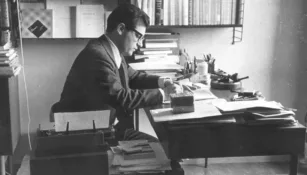ARTICOLI / 4 / Martino Feyles /
Exteriorization, expression, writing. Reading Husserl with Derrida
In this article, the author addresses the issue of exteriorization from a phenomenological perspective, considering the works of Husserl and Derrida. The concept of exteriorization is not important within the phenomenological tradition as has within the philosophy of technology. However, one of the crucial problems highlighted by Derrida’s critique of Husserl is the problem of expression, which is undoubtedly closely linked to the problem of exteriorization. Husserl recognizes the need to distinguish between two different kinds of signifiers, namely, expressions and indications. The essay aims to analyse the theoretical legitimacy of this distinction. Behind this issue lies another problem, namely, understanding the relationship between language and technology. If it is true that exteriorization is one of the essential characteristics, of technology, analysing the distinction between indications and expressions means questioning the connection between technology and language.
Bibliografia
- Benveniste, E. 2009. Essere di parola. Semantica, soggettività, cultura (1966-1974), a cura di P. Fabbri, Milano, Mondadori.
- Bernet, R. 1988. Husserl’s Theory of Signs Revisited, in R. Sokolowski (ed. by), Edmund Husserl and the Phenomenological Tradition, Washington D.C. The Catholic University of America Press
- Derrida, J. 1985. La farmacia di Platone, tr. it. di R. Balzarotti, Milano, Jaca Book.
- Derrida, J. 1995. Memorie per Paul de Man, tr. it. a cura di S. Petrosino, Milano, Jaca Book.
- Derrida, J. 2006. Della grammatologia, tr. it. di R. Balzarotti et al., Milano, Jaca Book.
- Derrida, J. 2002. La scrittura e la differenza, tr. it. di G. Pozzi, Torino, Einaudi.
- Derrida, J. 1975. Posizioni, a cura di G. Sertoli, Verona, Bertani.
- Derrida, J. 2001. La voce e il fenomeno, tr. it. di G. Dalmasso, Milano, Jaca Book.
- Derrida, J. 2006. L’animale che dunque sono, (a cura di) G. Dalmasso, Milano, Jaca Book.
- Evans, C. 1995. Indication And Occasional Expressions, in W. Mckenna and C. Evans (ed. by), Derrida And Phenomenology, Dordrecht, Springer.
- Husserl, E. 2005. Ricerche Logiche, vol. I, a cura di G. Piana, Milano, il Saggiatore.
- Husserl, E. 2005. Ricerche Logiche, vol. II, a cura di G. Piana, Milano, il Saggiatore.
- Husserl, E. 2002. Idee per una fenomenologia pura e per una filosofia fenomenologica, vol. I, a cura di V. Costa, Torino, Einaudi.
- Gurwitsch, A. 1977. Outlines of a Theory of ‘Essentially Occasional Expressions’ in J. N. Mohanty (ed. by) Readings on Edmund Husserl’s Logical Investigations, The Hague, Martinus Nijhoff.
- Lawlor, L. 2002. Derrida and Husserl, Bloomington & Indianapolis, Indiana University Press.
- Leroi-Gourhan, A. 1977. Il gesto e la parola, vol. II, Torino, Einaudi.
- Platone, 2016. Teeteto, Roma-Bari, Laterza.
- Stiegler, B. 1994. La tecnique et le temps, vol. I, Paris, Galilée.
- Vygotskij, Lev S. 1992. Pensiero e linguaggio, a cura di L. Mecacci, Roma-Bari, Laterza.

